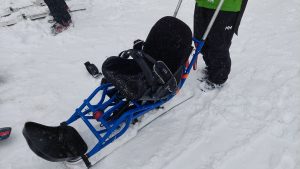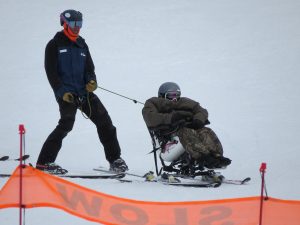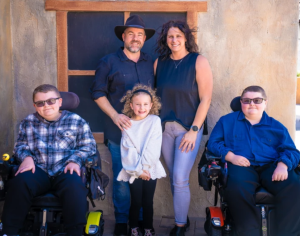- Slug: Sports-Snowbowl Adaptive Skiing, 975 words.
- 3 photos available
By Philip Leavell
Cronkite News
FLAGSTAFF – Mason Mogensen, 13, was unsure about his first skiing trip to Flagstaff. His home in Mesa was warm, comfortable and familiar. Even the excitement from his younger brother Jaxton, 11, did not alleviate his doubts. However, after the two boys ate snow, laughed, raced and flew down Mount Humphreys, Mason was grateful that his mom had forced him to get out of his comfort zone.
Hundreds of thousands of people travel to Arizona Snowbowl each year to ski and snowboard. However, for people with disabilities, it is not always possible to enjoy the snow with standard equipment. Because of this, High Country Adaptive Sports partners with AZ Snowbowl to provide adaptive equipment for anyone who needs it.
“Snowbowl is our biggest donor, they provide lift tickets and rentals to us at no cost,” said Truman Shoaff, programs director for High Country Adaptive Sports. “We are separate, but we are team members and we work together a lot.”
During the winter, the Flagstaff-based nonprofit company provides lessons with adaptive ski equipment at Snowbowl, the resort nestled on the western slope of Mount Humphreys, Arizona’s tallest point. After the snow season is over, High Country Adaptive helps provide equal access tools so users can experience other activities such as hiking, kayaking, rock climbing and mountain biking.
One event that High Country Adaptive hosts every year is called SkiAble. It partners with another nonprofit, Arizona Disabled Sports (AzDS), to provide lessons to people from the Valley. Athletes sign up for the event through AzDS and then High Country Adaptive and its volunteers take care of all the equipment and lessons. This year, 14 people participated in the event.
“It’s always a fun time just to get out of the Valley from the heat a little bit,” said Tucker Garcia, director of special events and competition for AzDS. “The main mission is to provide sporting and recreation opportunities to those who have physical and visual impairments.”
This year, Mason and Jaxton Mogensen enjoyed their first SkiAble adventure.
“It was a really cool experience,” Mason said. “Everybody should try it.”
Jaxton said that his favorite part of the trip was “falling face-first into the snow.” Mason and Jaxton were diagnosed with Duchenne Muscular Dystrophy in 2018 when they were 7 and 5, respectively.
“They were completely average boys,” their mom, Melissa Mogensen said. “One day Mason had some trouble going up our stairs, and that’s what started this thing. He went to the doctor and we thought he pulled a muscle on our trampoline.”
Although Mason and Jaxton are disabled, that does not stop them from staying active. They both participate in power soccer and go on hunting trips with their dad, Blaine Mogensen.
“We want them to live as normal as possible,” Melissa said. “We just do what we can to make that happen.”
The brothers spent their time at Snowbowl in TetraSkis and in Bi Skis. Mason liked the TetraSki more because it is electrically powered and offers the skier a lot of control. Jaxton liked the Bi Ski because he enjoyed it when he got tipped into the snow.
“I think a lot of people should try sports,” Jaxton said. “Disabled people should try sports.”
Throughout the whole SkiAble experience, students receive help and guidance from trained volunteers and instructors. They help the athletes learn how to maneuver in the adaptive equipment and make sure that everyone stays safe.
“They were amazing,” Mason said. “They were super cool people.”
Melissa agreed.
“We could have a whole entire episode on just how amazing they were,” she said. “You don’t get that a lot … but those volunteers were just so incredible.”
Because High Country Adaptive hosts additional students during the SkiAble event, the Colorado-based Breckenridge Outdoor Education Center (BOEC) sends some interns to Snowbowl to help out and to receive some training. This year, four interns came to help at SkiAble.
“A few of (the BOEC interns) went to North Carolina’s adaptive program and then the rest of them will go to Aspen’s adaptive program,” Alyssa Kloser, BOEC winter intern, said. “So we all get a trip, but we were the lucky few getting to come to Snowbowl, which has been absolutely incredible.”
Added Molly Kodish, another Breckenridge Outdoor Education Center winter intern: “It’s such a cool, like little trip that we get to do, just to see how other companies do it. Because while we’re all doing adaptive snow sports in some way, it’s all really different and you get to meet really cool people and just see how they run.”
Shoaff also used to be a BOEC intern. “They do 30 lessons a day where we’re doing like six lessons a day here,” Shoaff said. “They bring their interns, who have less experience and we help train them, and they get to see new lessons and see a small program like ours. It’s just a really cool partnership that’s been going on for a long time.”
The instructors and volunteers recognize that each person is unique and has their own special story.
“It is so amazing how different every student is and even someone with the same diagnosis,” Everyone is so different. Every human is so different,” Kodish said.
Shoaff believes “it’s about getting to know someone for themselves and not just their disability. Not assuming that someone with a disability automatically needs your help, or needs a pat on the back, or that they’re having a hard time, or that it’s incredible that they’re here. They just want to ski and be a part of the general population like everybody else.”
Just because someone is disabled does not mean that they cannot participate in physical activities.
“Everyone should get to ski if they want to ski,” Kloser said.
Mason and Jaxton said they are excited to attend the SkiAble event again next year.
For more stories from Cronkite News, visit cronkitenews.azpbs.org.


